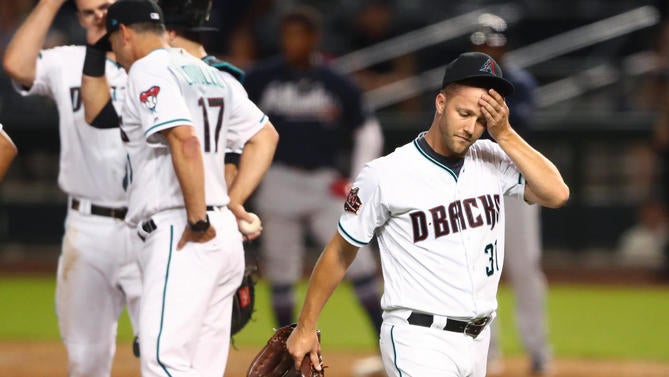
The D-Backs reinforced their bullpen at the trade deadline, but it caused their collapse anyway
Arizona's relief crew has blown game after game lately
After spending more than 100 days in sole possession of first place in the NL West, the Arizona Diamondbacks are in danger of missing the postseason completely. And much of the blame goes to the bullpen, the team's supposed strength.
Thursday afternoon the D-Backs lost for the 14th time in their last 20 games (COL 10, ARI 3) as six relievers combined to allow six runs and 12 baserunners in five innings against the Rockies. Trade deadline pickup Jake Diekman faced three batters, retired none of them, and was charged with three runs. Colorado broke the game open with a five-run seventh inning.
One night earlier new closer Yoshihisa Hirano took the loss after allowing a walk-off two-run home run to DJ LeMahieu. The team's recent 6-14 stretch has seen them fall from one game up in the NL West to 4 1/2 games back. SportsLine puts their postseason odds at 5.3 percent.
"(Wednesday) before the game I sat in Torey Lovullo's office, the manager of the Diamondbacks, and he said that Hirano is now his closer. Hirano had just saved his first Major League game ever the night before, but that's how bad the bullpen is," said former MLB GM Jim Bowden on CBS Sports HQ. "Middle of September, all of a sudden here's a new closer, and the next night he gives up the home run to LeMahieu and blows that game. And then they get hit again (Thursday)."
Arizona's bullpen woes go back much further than this week's series with the Rockies. Seven times during this 4-16 stretch the bullpen has turned a lead in the seventh inning or later into a loss. On two other occasions the bullpen took the loss in a game that was tied in the ninth inning. The club's bullpen ranks since August 1 are quite ugly:
- ERA: 5.10 (28th in MLB)
- WHIP: 1.55 (28th)
- Shutdowns: 31 (seventh fewest)
- Meltdowns: 27 (third most)
- Win probability added: -2.04 (28th)
- WAR: +0.6 (17th)
Only the Orioles and Marlins, two teams on pace to lose over 210 games combined, have had a more ineffective bullpen than the D-Backs in terms of earned runs and baserunners allowed since August 1.
The win probability data is especially damning. Shutdowns are relief appearances that improve the team's chances of winning at least six percent. Meltdowns are the opposite. Those are relief appearances that decrease the team's chances of winning at least six percent. The D-Backs are among the game's worst in both categories since August 1.

Bad bullpen stretches happen, but in Arizona's case, their bullpen is melting down after the team added reinforcements at the July 31 non-waiver trade deadline. They were among the most active teams before the deadline. Here's a recap of their bullpen additions prior to July 31:
- Acquired Matt Andriese from the Rays for Michael Perez and a prospect.
- Acquired Jake Diekman from the Rangers for two prospects.
- Acquired Brad Ziegler from the Marlins for a prospect.
Three new relievers at the deadline after signing Hirano and trading for Brad Boxberger, the team's closer until his recent demotion, in the offseason. Ziegler has a 3.38 ERA in 16 innings since the trade and has been among the club's more reliable bullpen arms late. Andriese and Diekman have allowed 24 runs in 26 innings with the D-Backs though.
D-Backs GM Mike Hazen and the team's front office had the right idea at the trade deadline. Adding bullpen depth is never a bad idea, especially for a contending team given how important bullpens have become in the postseason. Instead, the new relievers haven't helped much, if at all, and incumbents like Boxberger and Hirano are struggling at the wrong time.
Dropping three of four to the first-place Rockies this week and three of four to the second-place Dodgers two weeks ago more or less closes the door on Arizona's postseason chances. They're 4 1/2 games back the NL West with 15 to play. They're also four games back of the second wild card spot. Getting to October is not impossible. Just very unlikely.
And, should the D-Backs indeed miss the postseason after spending all that time in first place, the bullpen's performance in the second half will be the No. 1 reason why. Far too many winnable games slipped away -- again, seven times in the last 20 games Arizona had a lead in the seventh inning or later and did not win -- in the season's final weeks.


















